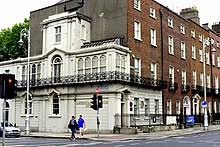The BFA major in musical theatre offers a conservatory and holistic approach to musical theatre training, one that not only concentrates on a participatory performance perspective, but also prepares the student for a wide and exciting range of careers available in the performing arts industry.
While performance remains an integral component of the programme, students are also prepared for the vast array of work that supports and produces performance, such as directing and staging, creating written material for performance, production, management, marketing and funding of the performing arts. The programme is based around live theatrical performance, whilst also preparing the graduate for further study in all cognate specialisms in musical theatre, as well as the required preparation skills for the professional industry.
The degree produces a wide spectrum of transferable skills such as effective presentational technique, expertise in using the voice and the body as communicative instruments, interpretational and compositional competency with written texts, management, marketing and organisational skills. These are applicable not only in the context of the many career paths within performing arts, but also in a wide variety of social, cultural and business vocations.
The programme’s structure combines conservatory training and academic classroom modules. Approximately two-thirds of total weekly contact hours consist of modules devoted to practical aspects of performance. Students are tutored in the required musical theatre modules -Music, Dance and Acting respectively, including private weekly tuition in vocal technique and vocal repertory. The students’ progress involves the development and accumulation of material for a portfolio which provides evidence of their achievement of the programme’s required learning outcomes, and functions as a basis for individual assessment. The remaining one-third of weekly contact hours concentrates on class-based academic instruction that supports and contextualises the ascending levels of practical training, and includes such subjects as theatre history, performance theory, drama and politics, creative writing, management and marketing.
Students are required to demonstrate an understanding of the integration and interdependence of the activities and to provide mutual support and encouragement for the group as a whole. The programme lays great stress on the development of an ensemble ethic; alongside the development of the individual’s creative impulses and abilities, the degree seeks to imbue the student with an awareness of the paramount importance of responsibility to the collective in musical theatre practice.

